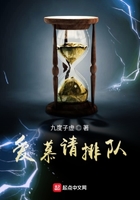As soon as it had fallen the barkers attacked it like locusts, and in a short time not a particle of rind was left on the trunk and larger limbs. Marty South was an adept at peeling the upper parts, and there she stood encaged amid the mass of twigs and buds like a great bird, running her tool into the smallest branches, beyond the farthest points to which the skill and patience of the men enabled them to proceed--branches which, in their lifetime, had swayed high above the bulk of the wood, and caught the latest and earliest rays of the sun and moon while the lower part of the forest was still in darkness.
"You seem to have a better instrument than they, Marty," said Fitzpiers.
"No, sir," she said, holding up the tool--a horse's leg-bone fitted into a handle and filed to an edge--"'tis only that they've less patience with the twigs, because their time is worth more than mine."
A little shed had been constructed on the spot, of thatched hurdles and boughs, and in front of it was a fire, over which a kettle sung. Fitzpiers sat down inside the shelter, and went on with his reading, except when he looked up to observe the scene and the actors. The thought that he might settle here and become welded in with this sylvan life by marrying Grace Melbury crossed his mind for a moment. Why should he go farther into the world than where he was? The secret of quiet happiness lay in limiting the ideas and aspirations; these men's thoughts were conterminous with the margin of the Hintock woodlands, and why should not his be likewise limited--a small practice among the people around him being the bound of his desires?
Presently Marty South discontinued her operations upon the quivering boughs, came out from the reclining oak, and prepared tea. When it was ready the men were called; and Fitzpiers being in a mood to join, sat down with them.
The latent reason of his lingering here so long revealed itself when the faint creaking of the joints of a vehicle became audible, and one of the men said, "Here's he." Turning their heads they saw Melbury's gig approaching, the wheels muffled by the yielding moss.
The timber-merchant was on foot leading the horse, looking back at every few steps to caution his daughter, who kept her seat, where and how to duck her head so as to avoid the overhanging branches.
They stopped at the spot where the bark-ripping had been temporarily suspended; Melbury cursorily examined the heaps of bark, and drawing near to where the workmen were sitting down, accepted their shouted invitation to have a dish of tea, for which purpose he hitched the horse to a bough. (Grace declined to take any of their beverage, and remained in her place in the vehicle, looking dreamily at the sunlight that came in thin threads through the hollies with which the oaks were interspersed.
When Melbury stepped up close to the shelter, he for the first time perceived that the doctor was present, and warmly appreciated Fitzpiers's invitation to sit down on the log beside him.
"Bless my heart, who would have thought of finding you here," he said, obviously much pleased at the circumstance. "I wonder now if my daughter knows you are so nigh at hand. I don't expect she do."
He looked out towards the gig wherein Grace sat, her face still turned in the opposite direction. "She doesn't see us. Well, never mind: let her be."
Grace was indeed quite unconscious of Fitzpiers's propinquity.
She was thinking of something which had little connection with the scene before her--thinking of her friend, lost as soon as found, Mrs. Charmond; of her capricious conduct, and of the contrasting scenes she was possibly enjoying at that very moment in other climes, to which Grace herself had hoped to be introduced by her friend's means. She wondered if this patronizing lady would return to Hintock during the summer, and whether the acquaintance which had been nipped on the last occasion of her residence there would develop on the next.
Melbury told ancient timber-stories as he sat, relating them directly to Fitzpiers, and obliquely to the men, who had heard them often before. Marty, who poured out tea, was just saying, "I think I'll take out a cup to Miss Grace," when they heard a clashing of the gig-harness, and turning round Melbury saw that the horse had become restless, and was jerking about the vehicle in a way which alarmed its occupant, though she refrained from screaming. Melbury jumped up immediately, but not more quickly than Fitzpiers; and while her father ran to the horse's head and speedily began to control him, Fitzpiers was alongside the gig assisting Grace to descend. Her surprise at his appearance was so great that, far from ****** a calm and independent descent, she was very nearly lifted down in his arms. He relinquished her when she touched ground, and hoped she was not frightened.
"Oh no, not much," she managed to say. "There was no danger-- unless he had run under the trees where the boughs are low enough to hit my head."
"Which was by no means an impossibility, and justifies any amount of alarm."
He referred to what he thought he saw written in her face, and she could not tell him that this had little to do with the horse, but much with himself. His contiguity had, in fact, the same effect upon her as on those former occasions when he had come closer to her than usual--that of producing in her an unaccountable tendency to tearfulness. Melbury soon put the horse to rights, and seeing that Grace was safe, turned again to the work-people. His daughter's nervous distress had passed off in a few moments, and she said quite gayly to Fitzpiers as she walked with him towards the group, "There's destiny in it, you see. I was doomed to join in your picnic, although I did not intend to do so."















